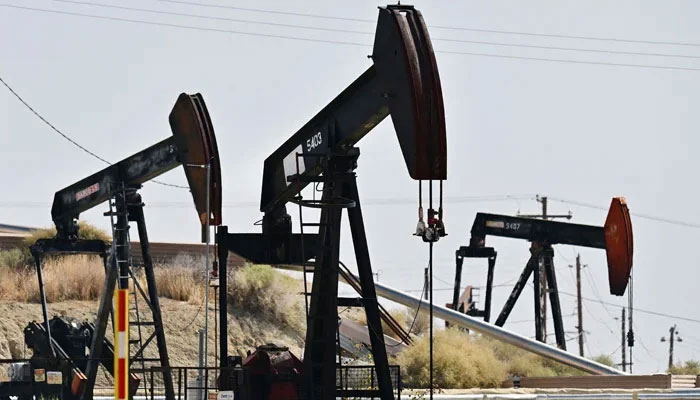Economic growth fuels optimism for OMCs
KARACHI: Anticipated economic growth is expected to bode well for oil marketing companies (OMCs) in Pakistan, as increased economic activity directly boosts demand in the oil sector.
According to estimates by the International Monetary Fund (IMF), the economy is projected to grow by 3.2 per cent in FY25, up from 2.5 per cent in the previous fiscal year. A further decline in interest rates could stimulate economic activity, leading to higher consumption of petroleum products (POL) and increased revenues for OMCs and dealers, according to a report by the Pakistan Credit Rating Agency (PACRA).
The transport sector remains the largest consumer of POL products, with stand-alone consumption reaching 18.7 million metric tonnes (MT) in FY24, marking a 7.5 per cent year-on-year (YoY) increase compared to 17.4 million MT in FY23. The report noted that rising automotive sales present an additional opportunity for increased consumption in the sector.
In recent years, Pakistan’s consumers have begun shifting towards hybrid and electric vehicles, mirroring global trends. This transition has been marked by a move away from older, inefficient fuel-consuming vehicles to more fuel-efficient engines, with hybrids offering zero fuel consumption. The report highlighted the growing market presence of Chinese players such as Haval and BYD, which could reduce the transport sector’s reliance on POL consumption over time. To adapt, OMCs may need to diversify by investing in electric vehicle charging infrastructure.
POL consumption in the industrial segment is closely linked to the country’s large-scale manufacturing (LSM) sector, which accounted for 7.1 per cent of total petroleum consumption. However, negative LSM growth of 0.76 per cent YoY in Q1 FY25 suggests that industrial POL demand may fall short of expectations this fiscal year.
In a positive development, the Oil and Gas Regulatory Authority (Ogra) has proposed increased margins for OMCs and dealers, citing the digitisation and automation of fuel pumps. The PACRA report called this “a positive step”, noting it would encourage investment in the sector and enhance operational efficiency. The measure could also attract new market entrants and provide relief to existing players facing economic challenges.
Despite these opportunities, several major players have recently divested or attempted to exit Pakistan due to ongoing financial crises, economic slowdowns and unfavourable exchange rates. Shell Pakistan, in particular, suffered losses in 2022 and 2023, driven by rupee devaluation and overdue receivables.
However, international interest in Pakistan’s oil marketing industry is resurging. Aramco, the world’s largest oil company, recently opened its first filling station in Pakistan and acquired a 40 per cent equity stake in GO Petroleum. Similarly, Gunvor Group and Wafi Energy have acquired shares in Total Parco and Shell Pakistan, respectively. The report noted, “These investments reflect a renewed interest from global players in Pakistan’s oil marketing sector, signalling optimism for the country’s economic outlook.”
The report also highlighted that recent settlements with independent power producers (IPPs) have provided Pakistan State Oil (PSO), the country’s largest OMC, an opportunity to address its circular debt issues, further strengthening the sector’s financial health.
-
 18-month Old On Life-saving Medication Returned To ICE Detention
18-month Old On Life-saving Medication Returned To ICE Detention -
 Cardi B Says THIS About Bad Bunny's Grammy Statement
Cardi B Says THIS About Bad Bunny's Grammy Statement -
 Major Hollywood Stars Descend On 2026 Super Bowl's Exclusive Party
Major Hollywood Stars Descend On 2026 Super Bowl's Exclusive Party -
 Sarah Ferguson's Silence A 'weakness Or Strategy'
Sarah Ferguson's Silence A 'weakness Or Strategy' -
 Garrett Morris Raves About His '2 Broke Girls' Co-star Jennifer Coolidge
Garrett Morris Raves About His '2 Broke Girls' Co-star Jennifer Coolidge -
 Winter Olympics 2026: When & Where To Watch The Iconic Ice Dance ?
Winter Olympics 2026: When & Where To Watch The Iconic Ice Dance ? -
 Melissa Joan Hart Reflects On Social Challenges As A Child Actor
Melissa Joan Hart Reflects On Social Challenges As A Child Actor -
 'Gossip Girl' Star Reveals Why She'll Never Return To Acting
'Gossip Girl' Star Reveals Why She'll Never Return To Acting -
 Chicago Child, 8, Dead After 'months Of Abuse, Starvation', Two Arrested
Chicago Child, 8, Dead After 'months Of Abuse, Starvation', Two Arrested -
 Travis Kelce's True Feelings About Taylor Swift's Pal Ryan Reynolds Revealed
Travis Kelce's True Feelings About Taylor Swift's Pal Ryan Reynolds Revealed -
 Michael Keaton Recalls Working With Catherine O'Hara In 'Beetlejuice'
Michael Keaton Recalls Working With Catherine O'Hara In 'Beetlejuice' -
 King Charles, Princess Anne, Prince Edward Still Shield Andrew From Police
King Charles, Princess Anne, Prince Edward Still Shield Andrew From Police -
 Anthropic Targets OpenAI Ads With New Claude Homepage Messaging
Anthropic Targets OpenAI Ads With New Claude Homepage Messaging -
 US Set To Block Chinese Software From Smart And Connected Cars
US Set To Block Chinese Software From Smart And Connected Cars -
 Carmen Electra Says THIS Taught Her Romance
Carmen Electra Says THIS Taught Her Romance -
 Leonardo DiCaprio's Co-star Reflects On His Viral Moment At Golden Globes
Leonardo DiCaprio's Co-star Reflects On His Viral Moment At Golden Globes




